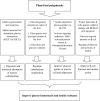Dietary polyphenols as potential nutraceuticals in management of diabetes: a review
- PMID: 23938049
- PMCID: PMC7968452
- DOI: 10.1186/2251-6581-12-43
Dietary polyphenols as potential nutraceuticals in management of diabetes: a review
Abstract
In recent years, there is growing evidence that plant-foods polyphenols, due to their biological properties, may be unique nutraceuticals and supplementary treatments for various aspects of type 2 diabetes mellitus. In this article we have reviewed the potential efficacies of polyphenols, including phenolic acids, flavonoids, stilbenes, lignans and polymeric lignans, on metabolic disorders and complications induced by diabetes. Based on several in vitro, animal models and some human studies, dietary plant polyphenols and polyphenol-rich products modulate carbohydrate and lipid metabolism, attenuate hyperglycemia, dyslipidemia and insulin resistance, improve adipose tissue metabolism, and alleviate oxidative stress and stress-sensitive signaling pathways and inflammatory processes. Polyphenolic compounds can also prevent the development of long-term diabetes complications including cardiovascular disease, neuropathy, nephropathy and retinopathy. Further investigations as human clinical studies are needed to obtain the optimum dose and duration of supplementation with polyphenolic compounds in diabetic patients.
Figures

References
-
- Evans JL, Goldfine ID, Maddux BA, Grodsky GM. Oxidative stress and stress-activated signaling pathways: a unifying hypothesis of type 2 diabetes. Endocr Rev. 2002;23:599–622. - PubMed
-
- Spranger J, Kroke A, Möhlig M, Hoffmann K, Bergmann MM, Ristow M, et al. Inflammatory cytokines and the risk to develop type 2 diabetes: results of the prospective population-based European Prospective Investigation into Cancer and Nutrition (EPIC)-Potsdam Study. Diabetes. 2003;52:812–817. - PubMed
-
- Montonen J, Knekt P, Järvinen R, Reunanen A. Dietary antioxidant intake and risk of type 2 diabetes. Diabetes Care. 2004;27:362–366. - PubMed
LinkOut - more resources
Full Text Sources
Other Literature Sources

